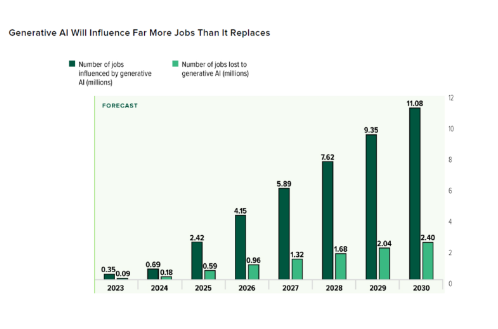What Impact Will Generative AI Have on Future Employment?
-
Forrester's latest report states that the 'over-adoption' of generative AI (GenAI) will eliminate 2.4 million jobs by 2030 while reshaping over 11 million jobs, depicting a future scenario filled with 'magic and chaos.'
In a report released on August 30 regarding GenAI's impact on employment, Forrester described the technology in paradoxical terms. Since the launch of ChatGPT 10 months ago, GenAI has rapidly become mainstream. On one hand, it has been widely adopted for its seemingly magical results, but on the other hand, this 'magic' will also bring chaos to the job market.

The report cites a February survey by Resumebulder.com, which found that a quarter of companies have already replaced employees with ChatGPT. Goldman Sachs predicts that GenAI could boost global economic output by 7% (approximately $7 trillion) while automating the equivalent of 300 million full-time jobs. However, Forrester analysts wrote, 'Exaggerated predictions, heartbreaking facts, widespread panic—it's hard to see the extent of the fire through the smoke.' They argue that only through analysis based on the most reliable data can we truly understand GenAI's impact on employment.
According to Forrester's estimates, by 2030, automation and AI combined will replace 4.9% of jobs, with 30% of job losses—about 2.4 million positions—primarily due to GenAI. However, analysts note that while GenAI automates some jobs, it will also transform how 11 million jobs are performed, a difference of 4.5 times.

The analysts wrote, 'Jobs that are easier to automate and have high AI impact, such as technical writers, social science research assistants, proofreaders, and copywriters, are more likely to disappear.' 'Jobs with high generative AI impact that are harder to automate, such as editors, authors, poets, lyricists, and creative writers, are more likely to see changes in how the work is done (through augmentation) rather than being replaced.' Forrester states that the number of jobs GenAI will impact is 4.5 times the number it directly replaces.
Forrester also pointed out that office and administrative jobs will be hit the hardest, with mid-level positions paying moderate wages suffering the most. Higher-paying, more senior roles are more resistant to GenAI. They wrote that management positions will largely remain unaffected by GenAI "because their work relies on human skills such as judgment, empathy, and leadership."
So, how should business leaders prepare for the "magic and chaos" of GenAI? Forrester analysts offered several suggestions. One is to invest in "RQ" (Robot Quotient), a metric that measures an individual's ability to adapt to AI and automation. Another recommendation is to make augmentation a core part of the strategy.
Forrester analysts also advised business leaders to take a proactive approach to GenAI by analyzing which job roles will benefit the most and then equipping employees with the right tools. Of course, investing in GenAI development skills is essential, as employees need to be able to leverage these new technologies.
Although no one knows exactly how the GenAI race will end or what the third phase will look like, one thing is certain: it will be highly competitive.
